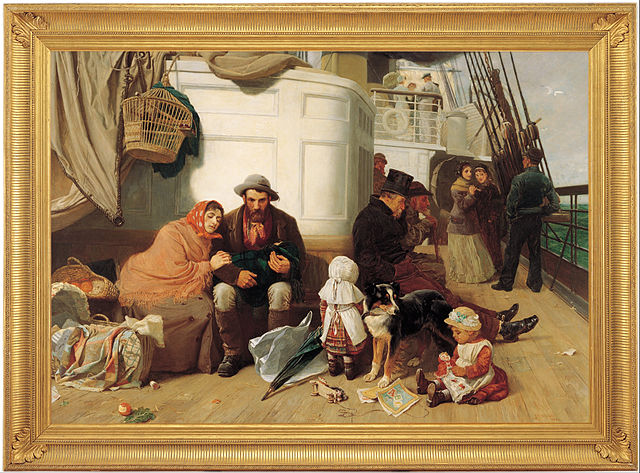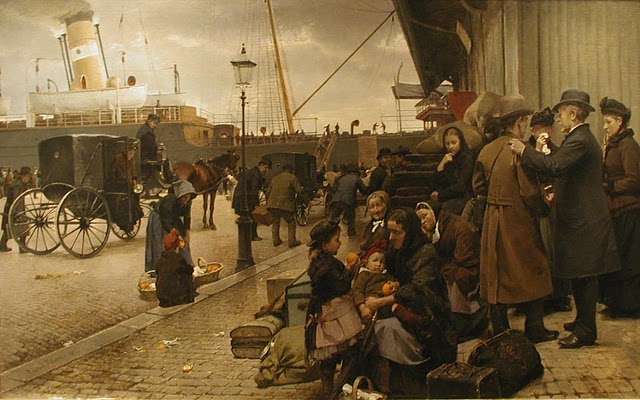
More commonly confused words
Immigrant / emigrant / migrant
An immigrant is a newcomer or settler who arrives in a foreign country to live. Emigrants are people who leave their own country to move somewhere else. Migrants are people who move from one area to another in search of better living conditions. Clearly all these words are related, yet they have specific meanings that are good to remember if they are used in a research paper or academic article. The main sense of the noun immigrant, like the verb to immigrate, is the arrival. Someone who appears in a new place is rightly called an immigrant. The main focus of the noun emigrant, or the verb to emigrate, is on departure. Emigrants leave their homelands to go somewhere else. The noun migrants, like the verb to migrate, refers to people who are regularly on the move, such as nomads or transients, perhaps trying to find better work opportunities. Depending on the subject of the paper or article, immigrants or emigrants or migrants may be more appropriate to the context. To make it easier to remember the specific meanings of each term, it may help to make up a little phrase:
- The immigrants arrived in the new land.
This should help remind us that the noun immigrants refers especially to people showing up in a new place. Similarly, we can try to remember the following phrase:
- The emigrants emerged from their homeland.
This should underline that the main point of the noun emigrants is that it refers to people who leave, go out, or otherwise emerge from the places of their birth. A third phrase can help with the remaining term:
- Migrants make many m
This should emphasize that the noun migrants means people who are often on the go, who do not stay in one place. Here are some examples of usage:
- Korean-American author Krys Lee paints an extraordinary portrait of the trials of immigrants in her debut collection of short stories.
- A yellow taxi ferries passengers through New York. Stories are legion of skilled immigrants who were doctors or lawyers in their countries of origin reduced to driving a cab in the United States.
- Laos gets tough with immigrants. These immigrants work mainly as hawkers, nail cutters and painters, beauticians, scrap metal collectors and buyers. Most entered Laos as tourists, but have subsequently found work and stayed.
- Malaysia cracks down on illegal immigrants. Several illegal immigrants have so far been found crouched in concealed rooms, secret compartments in ceilings, behind walls and even under the floorboards. They were among the more than 1,000 illegal immigrants nabbed as part of the Ops 6P Bersepadu operation, which kicked off at midnight on Saturday.
- A museum about emigration has not only been teaching German schoolchildren about 19th-century hardships in Germany, but has also perked up a working-class town on Germany’s coast. “The emigration centre was one of the first big attractions in the new Bremerhaven harbour area in 2005,” says the port town’s head of tourism, Raymond Kiesbye. While touring the Emigration Centre every visitor follows the path taken by a fictitious emigrant. So with every ticket, one is almost buying into a 19th-century biography. The city of Hamburg has a similar museum of emigration. Germany has for centuries been a land of immigrants and emigrants.
- The seaside city of Pattaya now has another “walking street”, and it’s one that residents can proudly show off to visitors of all ages without fear of seeing any scantily clad bar workers. It’s a small road through the venerable Chinese community of Ban Chagngaew, and every Saturday the residents put on quite a show of their own… Eventually, though, the crop fields fell into neglect, the mills closed (except for the sole surviving flour mill) and many of the immigrants’ descendants turned into emigrants.
- The rock star Sting has said he is “saddened and distressed” following reports that illegal migrants were discovered working on his luxury Italian estate. Used to grow olive trees, grapes and other fruit, the singer’s 350-hectare (865-acre) wine-producing estate is reportedly part of a police investigation into illegal migrant labour.’
- Unesco Bangkok, Microsoft Thailand, True Corp and the Office of Informal and Non-Formal Education (ONIE) will formally launch an initiative aimed at harnessing the potential of information and communications technology to migrant learners along the Thai-Myanmar border on November 24. The “Mobile Literacy for Out-of-School Children Project”, which will be officially launched in Bangkok, aims to enhance the basic literacy and numerical skills of thousands of migrant, ethnic minority and stateless children in Thai-Myanmar border areas via the use of ICT devices.
- Canadian Prime Minister Justin Trudeau has announced a US$5.5 million project to protect migrant workers in the Asean region. During his visit to New York to attend the United Nations Summit for Refugees and Migrants on Monday, he announced that Canada will work in partnership with the International Labour Organisation (ILO) to support Asean’s regional efforts aimed at strengthening policies that defend migrant workers, particularly women. The project will also ensure migrant workers receive equitable economic and social benefits, and help improve job mobility across Asean.
Simple / simplistic
Simple is an adjective with several meanings, most of them positive. Simple can mean something that is easy to do or presents no problems. It can also refer to something that is plain or undecorated. It can also mean something natural and humble. In science, simple
is often used to mean a substance that is basic, not a compound. In botany, a leaf that is simple is undivided. An old term, now out of fashion, once referred to mentally disabled people as simpleminded, but this is now considered insulting, so it is better not to use it, especially in an academic article or term paper. In contrast to these mostly positive words, the adjective simplistic has a definite negative meaning, of trying to make something seem simple when it is not. A facile or oversimplified proposal to solve a problem could be called simplistic. To remember that simple is usually good, meaning plain, and simplistic is not, try to make up some sample phrases such as these:
Don’t be unrealistic or simplistic.
Remembering that simple is usually good should not be difficult for anyone who eats at S&P Simply Delicious restaurants. Since the restaurant uses the word simply to promote its products, we can be confident that this is meant to be a good thing. Some usage examples:
- He was thinking about the verse that said perfect love casts out fear but didn’t want to say it, for the words would sound like a simplistic answer.
- What has happened is that it is based upon society’s simplistic estimations of what is worthy of high regard.
- The simple solution to a problem can very often be the right one, but a simplistic one can never be anything but wrong. If you say it’s simplistic you mean, or ought to mean, that the difficulties involved have been underestimated – oversimplified, in fact.
- Finally, a petite young woman in black pants and simple crop-top with a geometric neck accent arrived, greeting guests with a smile and introducing herself simply as Miranda. Her designs are known for their simple and clean cuts with the twist of asymmetrical and geometrical lines, creating an edgy and chic look suited for women of different age ranges and professions. The simple and practical collection is inspired by Miranda’s experience when doing internships with US top designers like Jill Stuart and Joseph Altuzarra in New York in 2013.
- Five simple steps outlined for SMEs to do business online at meet on digital economy.

(All images courtesy of Wikimedia Commons).
